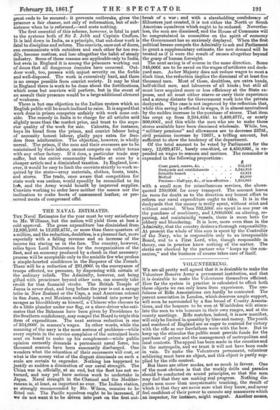THE NAVAL ESTIMATES.
THE Naval Estimates for the year must be very satisfactory to Mr. Williams, but the nation will yield them at best a cold approval. The gross expenditure has diminished from 12,836,100/. to 12,029,4751., or more than three-quarters of a million, and the reduction, doubtless, is a pleasant fact, more especially with a falling revenue and an increase of the income tax staring us in the face. The country, however, relies tpon Lord Palmerston for the reorganization of the fleet, and an economy produced by a check in that necessary process will be acceptable only to the amiable few who profess a simple-hearted confidence in the Emperor of the French. There will be a reduction of 231,000/. in the conveyance of troops effected, we presume, by dispensing with certain of the ordinary reliefs. The Admiralty, however, not being gifted with prescience beyond other men, can scarcely take credit for that financial stroke. The British Temple of Janus is never shut, and long before the year is out a savage tribe in New Zealand or the Cape, a mad American colonel in San Juan, a red Mexican suddenly hoisted into power by savages as bloodthirsty as himself, a Chinese who chooses to do a little plunder under our flag, or a slave-driver who esti- mates that the Bahamas have been given by Providence to the Southern confederacy, may compel the Board to triple this item of expenditure. The next serious reduction is one of 354,000/. in seamen's wages. In other words, while the manning of the navy is the most serious of problems—while every captain in the service complains of the untrained louts sent on board to make up his complement—while public opinion earnestly demands a permanent naval force, ten thousand seamen have been summarily discharged. One wonders what the education of their successors will cost, or what is the money value of the disgust dismissals on such a scale are certain to engender. • Nothing has happened to justify so sudden a diminution of our naval strength. The China war is, officially, at an end, but the fleet has not re- turned, and may yet have serious work to undertake in Japan. Naval strength in the Channel and the Mediter- ranean is, at least, as important as ever. The Indian station, so strongly recommended by Mr. Wilson, remains to be fitted out. The Pacific squadron ought to be increased, if we do not want it to be driven into port on the first out- break of a war ; and with a slaveholding confederacy of filibusters just created, it is not either the North or South American squadrons which ought to be reduced. Neverthe- less, the men are dismissed; and the House of Commons will be congratulated in committee on the spirit of economy the Government has so anxiously displayed. When the first political breeze compels the Admiralty to ask and Parliament to grant a supplementary estimate, the new demand will be treated as if it were the result of causes altogether beyond the grasp of human foresight.
The next saving is of course in the same direction. Some 348,000/. are to be saved on the wages of artificers and dock- yard men. As her Majesty does not reduce wages to meet a slack time, the reduction implies the dismissal of at least five thousand men. Most of these, doubtless, are extra hands, half-skilled men, and labourers of all kinds ; but still all must have acquired more or less efficiency at the State ex- pense, and all must either starve or carry their experience and a strong distaste for Government work into the private dockyards. The case is not improved by the reflection that, while this saving is effected in wages, it is almost neutralized by the sudden increase in the purchase of stores. That item has crept up from 3,204,434/. to 3,489,4771., or nearly 300,0001., and this while the men who are to make those stores available have been dismissed wholesale. While, too, "military pensions" and allowances are to decrease 23761., civil pensions increase by 73674 a trifling amount, but sufficient to show the tendency of the department. Of the total amount to be voted by Parliament for the navy, 12,029,4751., barely one-third, or 4,450,8391., is ex- pended on wages to seamen and marines. The remainder is expended in the following proportions :
Coast guard, reserve, &c. . . . 253,422 Dockyards and establishments . . . 5,845,853 Scientific branch . . . 63,851 Medical . 66,000 Pensions—Half-pay, &c., of non-effectives . 1,850,865
with a small sum for miscellaneous services, the above- quoted 250,000/. for army transport. The account leaves no room for doubt as to the direction any honest effort to reform our naval expenditure ought to take. It is in the dockyards that the money is really spent, without stint and without control. When 762,590/. are spent in one year on the purchase of machinery, and 1,800,000/. on altering, re- pairing, and maintaining vessels, there is room both for jobbery and blundering. It is here, more even than in the Admiralty, that the country desires a thorough responsibility. At present the whole of this sum is spent by the Controller of the Navy, who is responsible only to an irresponsible Board, and to a First Lord, who, though responsible in theory, can in practice know nothing of the matter. The clerks are checked by the partner who "keeps up the con- nexion," and the business of course takes care of itself.






























 Previous page
Previous page